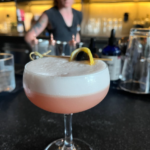By Jared Waugh
Gordon wished that he had been awake when the buildings disappeared.
At least, he wished he had been doing something to document it. Taking a photo on his phone, a video, something. All of those Instagram Live videos that his younger sister was always doing didn’t seem as stupid to him at that moment.
But he hadn’t managed to document anything. There hadn’t been time. One minute he had been walking down the street that he had grown up on–driving back from a family reunion, he was passing by his old neighborhood and he had decided to get out and walk around on a whim–and the next he was lying down on the sidewalk. He could not remember how long he was out for; it was a cloudless day, and the sun’s position in the clear blue sky looked unchanged, so he assumed that not much time had passed. He remembered that he had heard a low buzzing sound while walking, and at first concluded that it was just a cicada. The buzzing had grown in intensity over the course of a few seconds however, and Gordon could remember looking all around him for its source but could find none, and then he remembered feeling like the sound was coming from the space between his ears, and how bad it had hurt, and how he couldn’t see and needing to find shelter from the pain and the sound, but how could he, it was coming from everywhere.
And he remembered nothing after that. He assumed that was when he had blacked out, then and there, in the street. As he slowly stood up and began to gather himself, Gordon was relieved to find that the blinding pain from before was gone; he was less relieved to find that the buildings were gone, too.
Gordon was not a few yards away from where he parked his truck, at the end of the street where he had grown up, so he knew that on his left there should have been the corner store where he and his mother had gone to buy the basic necessities–one of his earliest memories was that walk across the street and around the corner, holding his mother’s hand, though he could only remember looking directly at the road in front of him–but instead there was just…nothing. Nothing to suggest that the corner store had ever been there, except for a six-sided outline where the building sat, light gray concrete contrasting the black asphalt surrounding it. No plumbing or wires of any kind sticking out, either. It was like a giant hand had come, plucked the corner store up, and then smoothed out the ground beneath to hide any evidence that something had been taken. That anything had ever even been there.
Gordon also knew that on his right, across the street, should have been the house that he had grown up in. For the first time, he turned his head and braved a look across the street. Where the asphalt driveway had once led to a one-story brick house and garage, it now led to a patch of brown, dried up grass occupying the space where the house had once sat. It was like his childhood home was a tent that had been pulled away after a few hours at a country fair, its negative effect on the lawn the only indication that something had once been there.
Gordon began to walk across the street towards his old yard, not bothering to look for cars before he did so. God, are there even still cars? He thought to himself as he looked straight ahead.
“Of course there are still cars,” he responded. “Your truck is right there at the end of the roundabout, you were just looking at it.”
Oh yeah, Gordon thought back to himself. And even if there weren’t any other cars around, we don’t know that for certain. We’re dealing with the missing house right now.
“Right.”
One thing at a time, or you’ll drive yourself mental.
Gordon snorted. “More mental than I am already?”
He gave himself no reply. The pressure beneath his feet changed from hard asphalt to firm dirt and grass, and he found himself standing in his childhood yard.
Gordon looked straight ahead through the space where his childhood home had once stood to the backyard. He realized that he had more fond memories of playing in the backyard than he did in the front yard. Makes sense, he thought to himself, as his parents were more responsible than to let a four-year-old play in an area not ten feet from the road. He noticed that whoever was living there now had started what looked like a nice vegetable garden in the backyard; he could see big red tomatoes growing from the vines wrapped around a large, unweathered wooden stake.
Gordon had never gotten to know the new homeowners. How could he? He was only five years old when his family moved, and they had moved nearly an hour-and-a-half away. Outside of nostalgia and visiting local relatives, Gordon never really had much reason to come back. He hoped that they were well, regardless. He hoped that they hadn’t been at home when it disappeared.
He briefly wondered if he should hope that they were home when this happened. Would that have been a good thing? Who even knew. Who even knew what was going on. Gordon realized that he felt very stiff. He took a deep breath, shrugged his shoulders, and simultaneously exhaled and let his shoulders down. It helped. Something, at least, he thought.
Gordon then slowly walked over to the space housing the dying grass. He stopped suddenly with the tip of his shoe just resting outside of the outline. Gordon quickly threw his hands up and began feeling out the space where the walls of the building should have been, seeing if he could make contact with anything solid.
Nothing.
Satisfied, Gordon brought his hands back down, lifted a leg, and took a step into the outline, dry grass crunching beneath his feet. He walked straight ahead, looking straight ahead, until he reached the center of the house. Not taking his eyes off of the vegetable garden beyond, Gordon sank to his knees and kneeled. He didn’t look away from the garden; if he didn’t look beyond the garden, or the thick woods behind it, he wouldn’t have to turn around to see the rest of the damage. He wouldn’t have to think about the potential of any other missing cars, or buildings, or plants, or people. He wouldn’t have to see if the giant blue spruce tree across from the corner store was still there, or the gas station that stood in front of it. He wouldn’t have to worry about his family–his mom, dad, sister, aunt–people he had only seen a few hours ago, disappearing, or if he would ever see them again. He wouldn’t have to consider the possibility that this wouldn’t be the last time something like this happened.
Gordon had read somewhere that the human body– on a molecular level– generated different kinds of tears for different emotions. Tears of joy, grief, distress, they were all different by design. Gordon didn’t want to think that he was crying out of sadness based on what was happening right now– it didn’t feel like the right time for it– so when he felt his eyes welling up, and his cheeks becoming wet, he justified it by telling himself it was just stress. He repeated to himself: These aren’t tears of grief. There’s nothing to grieve over. This is just a measured response to stress!
Things can’t get any worse, at least. It was a phrase that Gordon was familiar with in general. Not that he believed it right at that moment.








